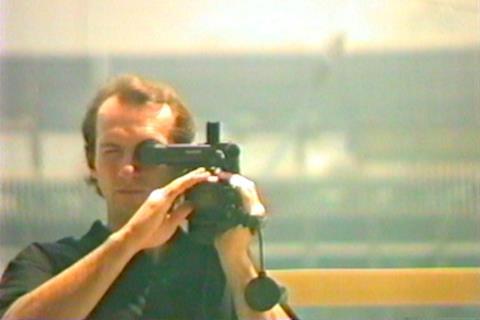Home video footage of 1980s Ukraine rubs up against its present in Maria Stoianova’s family history

Dir: Maria Stoianova. Ukraine/Norway. 2024. 95 mins
There has been no shortage of documentaries from Ukraine in recent years. Understandably, most, like Oscar-winner 20 Days In Mariupol, have been directly concerned with the ongoing Russian invasion, but Maria Stoianova’s feature debut, while ultimately also addressing the issue, takes a fascinating step back in time. She contemplates her homeland through the prism of her family’s home videos, shot by her ice skater father Mykhailo between 1986 and 1994.
An almost tactile intimacy
Footage from the 15 home videos, coupled with some promotional film for the Ukrainian ensemble Ballet On Ice, offer a snapshot of Ukraine from the unusual perspective of someone who was given visas to leave and travel to “capitalist countries” on tour (Ukraine gained its independence from the USSR in 1991). Stoianova also uses the film as a guide to modern Ukrainian history and as the starting point for a meditation on memory and the way that we are able to curate it through film, choosing what we want to remember over that which we wish to forget.
Stoianova offers an engagingly personal, and unusual, perspective that, coupled with the world’s ongoing interest in Ukraine, should help Fragments Of Ice travel to more festivals after its premiere in Visions du Reel. Home video may not be the cleanest looking medium but it has an almost tactile intimacy that welcomes curious viewers.
Stoianova’s guidance via voice-over requires concentration because she weaves together snippets from the Soviet ballet archives with her own thoughts and the recollections of her parents in a single voice. However her philosophical approach holds out a hand to help us step on the slippery ice of these memories as she considers their place within the wider socio-political fabric of Ukraine. Strong editing from Viktor Onysko - who was killed in the Russian invasion and to whom Stoianova pays moving tribute at the end of the film - and Maryna Maykovska helps to weave together these fragments into a cohesive overview of the period.
The camera and Stoianova arrived at about the same time - 1986 - in the life of her father. At the time, Ukraine was still part of the Soviet Union, which is why the prospect of a tour to Canada was such an exciting prospect for the young man. It was also the year of the Chernobyl disaster, just one of several incidents that could be said to find echoes in the country’s more recent history.
When she asked her father what it was like to travel to Canada, he said: “You leave the Soviet Union, cross the border and start breathing”. This sense of new-found freedom is reflected in his videos, which are as fascinated with the television programmes as the cities themselves. On a later tour of the United Arab Emirates, we watch as people gleefully stick “Fly buy Dubai” stickers to their kit. Tours of the USSR, meanwhile, are not committed to video. So far as her father was concerned, even the company’s skating bears were considered “too ordinary” there. While travelling, which brought with it the opportunity to save their per diem wages and shop, might be considered a privilege, footage from the family’s home - lined with boxes as they wait for their turn to have the opportunity to buy a bigger place from the state - speaks to a different sort of reality.
The perspective of Stoianova’s parents is also shown to shift after the declaration of independence as hopes and reality rub up against one another - the dream home has a habit of raining cockroaches. Although the film contains plenty of ice references, Stoianova also nudges at the fluidity of history and memory. We may freeze parts of it for a moment but we can never truly know where we lie on its continuum or when the past will assert itself, because, in the end, we can only live as resiliently as we’re able in the present moment.
Production companies: Tabor, Indie Film
International sales: gorlova@taborproduction.com
Producers: Alina Gorlova, Maksym Nakonechnyi, Carsten Aanonsen, Karianne Berge
Cinematography: Mykhailo Stoianov
Editing: Maryna Maykovska, Viktor Onysko
Music: Anton Dehtiarov






![The Brightest SunScreen[Courtesy HKIFF]](https://d1nslcd7m2225b.cloudfront.net/Pictures/274x183/3/5/0/1448350_thebrightestsunscreencourtesyhkiff_312678.jpg)















![The Brightest SunScreen[Courtesy HKIFF]](https://d1nslcd7m2225b.cloudfront.net/Pictures/100x67/3/5/0/1448350_thebrightestsunscreencourtesyhkiff_312678.jpg)


No comments yet